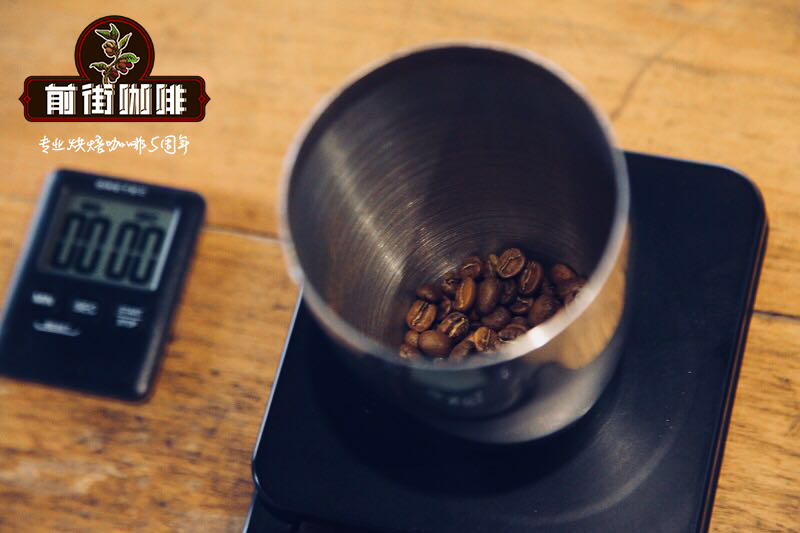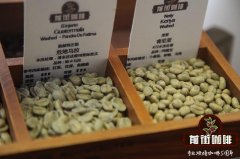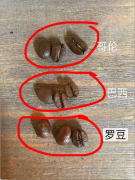Is the price low for robusta Arabica coffee bean producing area

Professional coffee knowledge exchange more coffee bean information please follow the coffee workshop (Wechat official account cafe_style)
Why are Robusta coffee beans so notorious? Robusta beans, which are round in appearance and look like soybeans at first glance, are also known as thick and strong beans. They have strong resistance to diseases and insect pests, large output and low price. The boutique coffee industry used to have a very poor impression of Robusta because it usually does not have a charming and meticulous flavor. The bigger problem is that because the setting is a low-cost product, most of the planting methods are very rough, resulting in a bad smell. It often smells like dirt, dirt, and sometimes even a smell like charred tires and burning plastic. Ten years ago, I had a chance to taste several cheap Robusta beans in Vietnam. Some of them tasted unforgettable, because they were almost like charred wheat tea seasoned with tires. With the other nine bad flavors, I couldn't help but spit them out. I don't want another sip.
If Robusta coffee beans are so bad, why talk about it? That's a good question! As mentioned at the beginning of this article, everything has its advantages and disadvantages. Good beans take you to heaven, rotten beans let you hang your heart! This is true of Arabica, and Robusta is no exception! In fact, under the tide of boutique coffee in recent years, exquisite robusta beans with high standard treatment have appeared in the world! The representative of boutique India Kappi Royale beans is India's Robusta (Robusta "Kappi Royale" Robusta).
Kappi Royale means "top grade". At present, there are at least four (and growing) private coffee farms in India to grow and produce high-quality "coffee royal" and "Kappi Royale" grade robusta coffee beans according to the standards and procedures of refined Arabica beans! It includes exquisite full water washing treatment and Pulp Natural mucosal drying semi-washing treatment which is popular in recent years. The advent of the "Coffee Royal" grade exquisite Robusta beans has undoubtedly begun to change the world's impression of Robusta! Most people who have drunk it will be surprised by its thick and clean characteristics. Because of its exquisite planting and handling routines, the Royale Robusta flavor is mostly quite clean, without the intrusive flavor of the cheap Robusta (off-flavors). The Robusta is born without the elegant aroma of Arabica beans, replaced by a thicker, calmer taste, as well as strong walnut, peanut, hazelnut and wheat flavors like peanut butter and hazelnut.
India's "Coffee Royal" grade Robusta currently produces very little, but it has begun to attract the attention of the elite of the boutique coffee industry all over the world. David Schumann, an expert in Italian coffee, David C. Schomer's famous Seattle-based Espresso Vivace began adding 14% of the Indian "Royal Coffee" Robusta to its Italian formula beans as early as a decade ago. Paradise Roasters, the national coffee evaluation points champion roaster, took the lead in the North American boutique coffee market, launching a 100% Indian CxR single espresso coffee in 2009 and 2010, and received a Coffee Review rating of 90 and 91 points in 2009 and 2010! It proves that Robusta is not what it used to be!
If you want to ask the country or region that loves Robusta coffee beans most, the first place is Italy, the hometown of espresso! If you narrow it down, to be more precise, the largest use of robusta beans is in southern Italy, such as Palermo, Naples and Sicilia. In fact, in southern Italy, most of the coffee people drink contains a considerable proportion of robusta beans. The content of 30% to 60 is commonplace, and the Robusta content of some formula beans is as high as 80% or even 100%!
Open the table of beans supplied by local wholesalers of raw coffee beans in Italy, and you will see a list of more than a dozen, or even as many as two dozen, raw beans from all over the world, for local coffee roasters to choose from. This phenomenon does not exist in other parts of the world, such as the United States and Canada, Northern Europe, Japan and even Taiwan.
You may wonder why the Italians mix a lot of robusta in Arabica beans. Generally speaking, Italians mix with Robusta in order to increase the Crema content of Espresso. This is only half true, and there is another little-known reason.
It turned out that southern Italy used to be a relatively poor region, where people could only afford cheap coffee, so at first it was mixed with Robusta beans simply to reduce costs. However, after years of massive baking and blending of Robusta, coupled with Italy's natural sensitivity to cooking, they found that Robusta beans have many qualities that Arabica beans do not have. as long as you are familiar with and fully master these qualities, a good cook (coffee roaster) will be able to serve magical dishes (Italian coffee beans). Compared with 44 pairs of chromosomes in Arabica beans, Robbosa beans have only 22 pairs of chromosomes, with caffeine contents of 1.5% and 2.8%, respectively. The two are completely different varieties and cannot be mixed, which explains why there are many complete differences between the two.
At the end of the comparison, there should always be a conclusion, perhaps it should be called the comparison of quality and quantity (quality vs. Quantity), Arabica coffee represents quality, while robusta coffee represents quantity. When you are interested in coffee
[flavor] (Flavor) when you care, the amount of money you pay determines what kind of coffee you deserve.
Qianjie coffee: Guangzhou bakery, the store is small but a variety of beans, you can find a variety of unknown beans, but also provide online store services. Https://shop104210103.taobao.com
Important Notice :
前街咖啡 FrontStreet Coffee has moved to new addredd:
FrontStreet Coffee Address: 315,Donghua East Road,GuangZhou
Tel:020 38364473
- Prev

How to eat Robusta coffee beans_Robusta coffee beans characteristics_Robusta how much money a catty
Professional coffee knowledge exchange More coffee bean information Please pay attention to coffee workshop (Weixin Official Accounts cafe_style) Arabica coffee bean shape is small, the front is long oval, the middle line crack is narrow and tortuous, S-shaped, the arc shape of the back of the bean is more complete. Robasta coffee beans are larger in shape, tend to be round on the front, and split cracks in the middle into straight lines. (with
- Next

The difference between Arabica beans and robusta beans _ Luodou picture difference _ coffee Luodou how
Professional coffee knowledge exchange more coffee bean information please pay attention to the coffee workshop (Wechat official account cafe_style) why adhere to 100% Arabica beans, Robusta beans is really not good? With regard to Robusta coffee beans, he is indeed a lower-priced coffee bean, and there is still a big difference in aroma between robusta coffee beans and Alabica beans. I think a lot of stores are mixed R.
Related
- Detailed explanation of Jadeite planting Land in Panamanian Jadeite Manor introduction to the grading system of Jadeite competitive bidding, Red bid, Green bid and Rose Summer
- Story of Coffee planting in Brenka region of Costa Rica Stonehenge Manor anaerobic heavy honey treatment of flavor mouth
- What's on the barrel of Blue Mountain Coffee beans?
- Can American coffee also pull flowers? How to use hot American style to pull out a good-looking pattern?
- Can you make a cold extract with coffee beans? What is the right proportion for cold-extracted coffee formula?
- Indonesian PWN Gold Mandrine Coffee Origin Features Flavor How to Chong? Mandolin coffee is American.
- A brief introduction to the flavor characteristics of Brazilian yellow bourbon coffee beans
- What is the effect of different water quality on the flavor of cold-extracted coffee? What kind of water is best for brewing coffee?
- Why do you think of Rose Summer whenever you mention Panamanian coffee?
- Introduction to the characteristics of authentic blue mountain coffee bean producing areas? What is the CIB Coffee Authority in Jamaica?

